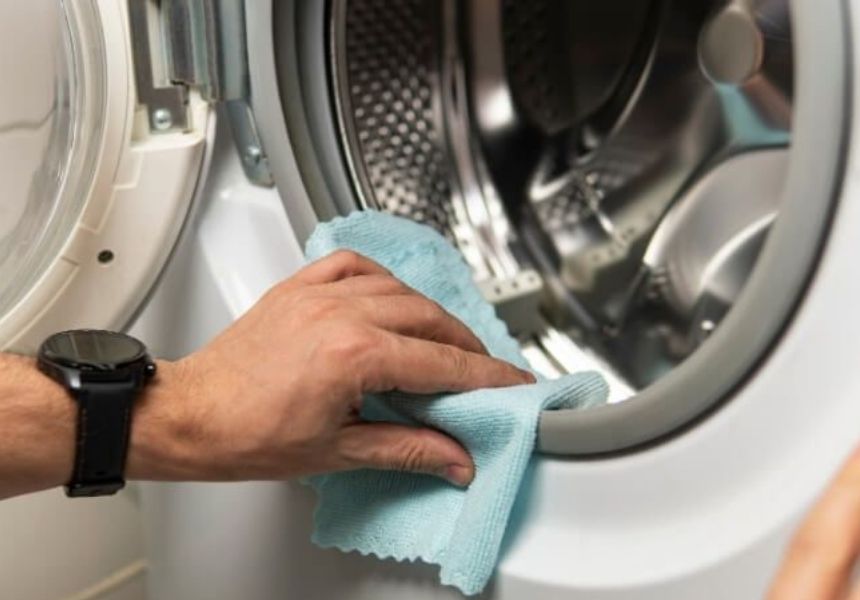Your washing machine is one of the most essential home appliances, designed to keep your clothes clean and fresh. But what happens when your washing machine itself starts to smell unpleasant? A smelly washing machine can not only cause discomfort but may also affect the freshness of your laundry. Persistent odors hint at underlying problems that can compromise hygiene and even damage your washing machine over time.
Addressing the root causes of washing machine odours is important, not just to eliminate embarrassing smells but also to maintain the appliance in optimum condition and ensure your clothes come out clean and fresh. This article explores the real reasons behind smelly washing machines and provides practical solutions and prevention tips to help you keep your washer smelling clean.
Why Does a Washing Machine Smell?

A smelly washing machine isn’t just an annoyance—it can affect the cleanliness of your laundry and even signal underlying maintenance issues. Several culprits contribute to those funky odours. Let’s break them down.
A. Buildup of Bacteria and Mould
First and foremost, washing machines create a perfect breeding ground for bacteria and mould. The warm, damp environment inside the drum, especially after a wash cycle, invites microbial growth. Moreover, door seals, detergent drawers, and hidden crevices trap moisture, allowing mold to thrive. If you notice a musty or mildew-like smell, bacteria and mould are likely the culprits. Regularly inspect the rubber gasket around the door of front-load machines, as it’s notorious for harbouring black mould.
B. Residual Detergent and Fabric Softener
Surprisingly, using too much detergent or fabric softener can backfire. Excess product doesn’t always rinse away completely, especially in low-temperature washes. Instead, it builds up inside the drum and hoses, creating a slimy residue that traps dirt and fosters odors. Over time, this residue becomes a breeding ground for bacteria, amplifying the smell. To combat this, measure your detergent carefully and opt for high-efficiency (HE) formulas if you have a modern machine.
C. Dirty or Clogged Drain Pump Filter
Another common offender is the drain pump filter, which traps lint, hair, and debris to prevent clogs. However, if you don’t clean it regularly, trapped gunk can start to smell. A clogged filter also hinders proper drainage, leaving standing water in the machine that contributes to odors. Most washing machines have an accessible filter, typically located at the bottom front of the machine. Check your manual and clean it every few months to keep things fresh.
D. Hard Water and Mineral Deposits
If you live in an area with hard water, mineral deposits like limescale can accumulate inside your washing machine. These deposits not only reduce the machine’s efficiency but also provide a surface for bacteria to cling to, worsening odours. Over time, limescale buildup in the drum and pipes can create a persistent musty smell. Using a descaling agent periodically can help mitigate this issue, especially in hard water regions
Signs Your Washing Machine Has an Odour Problem
Before diving into solutions, let’s identify the red flags that indicate your washing machine has an odour issue. First, if your freshly washed clothes smell musty or mildew-like, the machine is likely transferring odours to your laundry. Next, check for visible signs of mould or grime in the drum, door seals, or detergent drawer. Even if the machine is empty, a lingering, damp or musty smell signals a problem. Recognizing these signs early allows you to take action before the issue worsens.
How to Prevent and Eliminate Washing Machine Odours

Now that we’ve pinpointed the causes, let’s explore practical solutions to eliminate and prevent washing machine odours. With a few simple habits and regular maintenance, you can keep your machine smelling fresh and your laundry clean.
A. Regular Cleaning Practices
Cleaning your washing machine regularly is the most effective way to banish odours. Start by running a hot water cycle (at least 140°F or 60°C) once a month with a natural cleaner like white vinegar or a commercial washing machine cleaner. Here’s how:
- Vinegar Clean: Add two cups of white vinegar to the drum (no clothes) and run a hot cycle. Vinegar breaks down detergent residue and kills bacteria.
- Baking Soda Boost: For stubborn odours, sprinkle half a cup of baking soda into the drum during the rinse cycle to neutralise smells.
- Commercial Cleaners: Use a product like Affresh or Tide Washing Machine Cleaner for a deep clean, following the package instructions.
Additionally, clean the door seal, detergent drawer, and drain pump filter regularly. For the door seal, wipe it down with a vinegar-soaked cloth to remove mould and debris. Remove and soak the detergent drawer in warm, soapy water, scrubbing away any residue. For the drain pump filter, consult your machine’s manual to locate and clean it, removing trapped debris like lint or small objects.
B. Proper Usage Habits
Your daily laundry habits play a big role in preventing odours. First, always use the correct amount of detergent—check the packaging for guidelines based on load size and water hardness. Overloading the machine can also trap moisture and prevent proper cleaning, so stick to recommended load sizes. After each wash, leave the door open for at least an hour to let the drum dry completely. This simple step prevents mould growth. Finally, remove wet clothes promptly after the cycle ends to avoid mildew forming in the drum.
C. Maintenance Tips
Beyond cleaning, regular maintenance keeps your washing machine odour-free. Every three to six months, clean the drain pump filter to remove trapped debris and prevent clogs. In hard water areas, use a descaling agent like citric acid or a commercial descaler to break down limescale. Additionally, run a maintenance wash with a specialised cleaner every month to keep the machine in top condition. Check your manufacturer’s manual for specific maintenance recommendations tailored to your model.
Common Mistakes That Worsen Washing Machine Odours

Even with the best intentions, certain habits can make odours worse. Avoid these common mistakes to keep your machine smelling fresh:
- Overloading the Machine: Stuffing too many clothes into the drum prevents proper water circulation, leaving moisture and dirt trapped. Stick to moderate loads for better cleaning and drying.
- Using Too Much Detergent or Fabric Softener: Excess product leads to residue buildup, fostering bacteria and odours. Measure carefully and use HE detergents for modern machines.
- Ignoring Maintenance Guidelines: Skipping regular cleaning or filter maintenance allows odours to build up. Follow your machine’s manual for recommended care.
- Closing the Door Immediately: Shutting the door right after a cycle traps moisture inside, encouraging mould growth. Always leave the door ajar to air out the drum.
By avoiding these pitfalls, you’ll reduce the risk of odours and extend your machine’s lifespan.
When to Seek Professional Help

Sometimes, despite your best efforts, the odor persists. If regular cleaning doesn’t solve the problem, it might be time to call a professional. Persistent smells could indicate deeper issues, such as a clogged drain line, a malfunctioning pump, or mold growth in hard-to-reach areas like the internal hoses. Additionally, if your machine makes unusual noises, drains poorly, or shows error codes, a technician can diagnose and fix the problem. Schedule professional servicing annually or as needed to keep your machine in peak condition.
FAQs
How often should I clean my washing machine?
Clean your washing machine monthly with a hot water cycle and vinegar or a commercial cleaner. Additionally, wipe down the door seal and detergent drawer weekly and clean the drain pump filter every three to six months.
Can I use bleach to clean my washing machine?
Yes, but use it sparingly. Add half a cup of bleach to a hot water cycle (no clothes) to kill bacteria and mould. Avoid mixing bleach with vinegar, as it creates harmful fumes. Always rinse thoroughly afterwards.
Why do my clothes still smell after washing?
If clothes smell musty post-wash, the machine likely has mold or residue buildup. Clean the drum, seals, and filter, and ensure you’re using the right amount of detergent. Also, check that you’re not overloading the machine.





